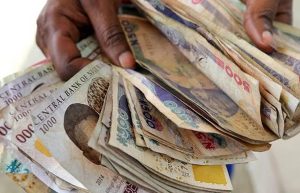Naira opens Wednesday strong at N382/$ in official window but struggles at BDC, street markets
August 5, 20201K views0 comments
So far, this week, the dollar, British pound and Euro have all recorded no movement against the naira in the exchange market as they began the week at ₦382.3, ₦499.4 and ₦449.3 respectively.
A month’s review of market activities shows that the US dollar started July at ₦386.1433 and trading at ₦382.3143 Tuesday represents a drop of 0.99 per cent against the naira. Similarly, the EUR was traded at ₦433.888 at the beginning of July but rose 3.56 per cent to trade at ₦449.3324. The British pound traded at ₦479.6985 at the start of last month, but has risen by 4.12 per cent to trade at ₦499.4446.
On the other hand, activities at the bureau de change (BDC) window saw business done at ₦473 to the dollar, ₦585 to the British pound and ₦536 to the Euro. Similarly, operators in the market bought at ₦468 to the dollar, while the pound and euro were bought at ₦580 and ₦530 respectively. The fall of the naira at this BDC window can be attributed to the dampening confidence of investors and licenced members on a daily basis and the persistent closure of accessibility to the proceeds of international money transfer operators’ services, which resulted in very low liquidity in the market, coupled with exchange rate volatility and spikes in the market.
Speaking on the state of the market, Aminu Gwadabe, the chairman of the Association of Bureaux de Change Operators of Nigeria (ABCON), told Business A.M: “The parallel market is in precarious, worrisome and disturbing situation. The market rate though not a transaction rate yet is a very potent factor for demand-pull inflation in the economy.
“The confidence of our members, the licenced bureaux de change, is falling on a daily basis as a result of the persistent closure of our accessibility to the proceeds of international monetary transfer operators services and resulting in very low liquidity in the market with exchange rate volatility and spikes in the market,” Gwadabe said.
On the other hand, to control the overwhelming scenario the regulators need to proactively and creatively deepen the sources of licenced bureaux de change operators to stem the falling value of the naira and save jobs, productivity and general price equilibrium, he advised.
Analysts say it is very difficult to forecast the future of the naira as the trajectory is volatile, and dicey with loss of investor confidence; and the possibility of the Central Bank of Nigeria swinging a surprise by reopening the BDCs window to achieve their policy of exchange rate unification.

